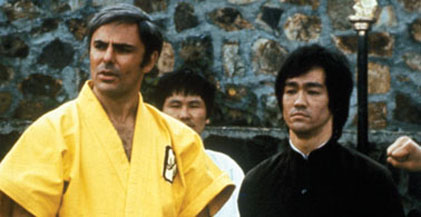|
|
Viking NightEnter the DragonBy Bruce HallDecember 21, 2010
His dream of creating films that spoke to the mind as well as the body may not have turned out to be so far fetched, after all. It is tempting to think that the slow transition of modern martial arts films from imitation and camp to serious meditation might have taken less time had Lee been around to help. But for every visionary there are legions of artistic, energetic individuals who possess the same creative instincts but lack the resources or force of will to create opportunities for themselves. Pioneers often have the most impact through those who follow them, and Bruce Lee is no exception to this. Sometimes opening the door enough for others to walk through is enough, even if you aren’t there to take the next step yourself. . Enter the Dragon is no more perfect a film than any other, and the story might have been a tad derivative even at the time - there’s more than a little Bond here, a little Eastwood there. But it remains a taut, well executed thriller that’s no less a blast to watch for the tenth time as it was for the first. Besides, taking existing ideas into new territory is what creativity is all about! Kurosawa cribbed Shakespeare, Sergio Leone borrowed from Kurosawa, Jackie Chan borrowed from Bruce Lee, and there aren’t many Asian actors today who don’t owe something to Jackie Chan. So, here we are today with more entertainment choices - good and bad - than any of these men would ever have thought possible. Maybe the greatest legacy of Bruce Lee, and of Enter the Dragon is that both paved new ways, both inspired others to achieve and dream, and both have yet to be equaled or surpassed. Certainly, creating something so enduring that it inspires others to follow you is the greatest legacy any artist can have. So despite what might have been, the lasting impression that Bruce Lee left on the world in his brief time here was worth the short visit, and his crowning achievement in film continues to be the bar by which all competitors are measured.
|

|
|
|

|
Friday, November 1, 2024
© 2024 Box Office Prophets, a division of One Of Us, Inc.


